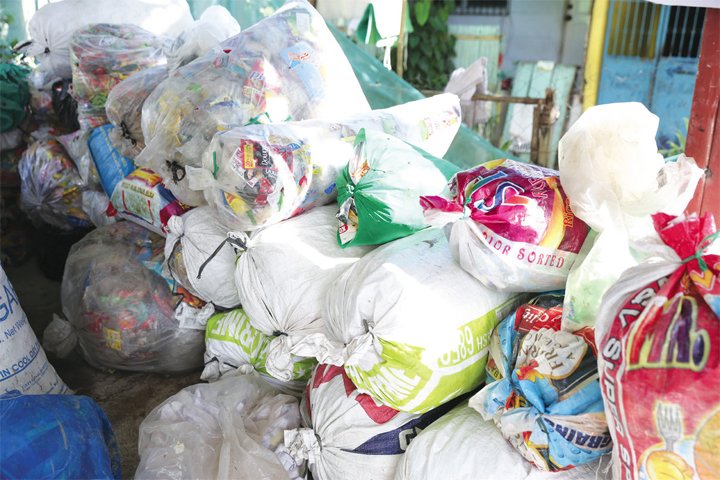
A total of 57,954 individuals have signed a petition calling on the country’s lawmakers to regulate and ban “problematic” single-use plastic packaging products in the Philippines.
Environmental groups have been condemning the packaging industry for the plastic wastes, including those that find their way into waterways and the ocean.
Single-use plastics are discarded after use, but because they are non-biodegradable, they remain in water bodies and over the years, break apart and become micro-plastics that contaminate human food as they are mistaken for food by fish and other marine life, in the ocean.
The petition initiated by various environmental groups was submitted to the Senate.
“The petition mirrors that our citizens already clamor for the passage of comprehensive law banning single-use plastics. The Senate should already act to pass a comprehensive bill that will mandate clear timelines on the phase-out of production, distribution and sale of problematic plastic products, while providing incentives to eco-friendly alternatives and systems,” Coleen Salamat, plastic solutions campaigner of EcoWaste Coalition said in a news statement.
Break Free From Plastic, EcoWaste Coalition, Global Alliance for Incinerator Alternatives, Greenpeace Philippines, Health Care Without Harm Asia, Mother Earth Foundation, Oceana Philippines International, Interfacing Development Interventions for Sustainability, Philippine Movement for Climate Justice, Project Mariknows, War on Waste Negros Oriental, Youth Advocates for Climate Action Philippines, Sea, and Terrestrial Environment Protectors, Freedom from Debt Coalition (FDC) Cebu, SANLAKAS Cebu, Kabataan Party-list, Panalipdan Youth Davao, Philippine Earth Justice Center, and 350.org Pilipinas are hoping that the petition will convince the 18th Congress to act on the petition and enact a measure that effectively regulates, if not totally ban, single-use plastic packaging materials and products that continue to cause environmental degradation.
“We need a law that is serious about tackling plastic pollution here in the country and needs to address it from the very first stage where problems manifest and that’s at extraction and production. Plastic creates problems for our climate, our environment and health throughout its different stages. A genuine solution to the plastic crisis should start upstream,” Marian Ledesma, zero waste campaigner of Greenpeace said for her part.
Specifically, the groups are calling for the Senate for an immediate timeline for the phasing out of single-use plastic products.
The new law, the group said, should be consistent with the Ecological Solid Waste Management Act (Republic Act 9003) and the Clean Air Act (Republic Act 8749), focus on sustainable systems and reusability of products, and mandate producers to cut back on use of single-use plastic.
PHL as pilot site
IN a related development Samal Island in the Philippines, along with the Mandalika, Lombok Island in Indonesia has been identified as the pilot sites of proposed solutions to the worsening plastic problem under the Ending Plastic Pollution Innovation Challenge Phase II of the United Nations Development Programme (UNDP).
Over 140 innovators joined the UNDP’s innovation challenge to combat plastic pollution in the Asia-Pacific region. From the group of innovators, 18 finalists were selected from seven countries—Indonesia, Philippines, Singapore, Cambodia, Vietnam, Malaysia, and Thailand, the UNDP announced in a news statement.
Launched early this year with the support from the Norwegian Ministry of Foreign Affairs and the Norwegian Agency for Development Cooperation (Norad) to help address the worsening plastic problem, the Ending Plastic Pollution Innovation Challenge Phase II or EPPIC seeks to find innovative ways to fight ocean plastic, that are under development but lack the support or visibility to grow.
In the Philippines, up to 60 billion plastic sachets are used each year, with Samal Island generating approximately 15,000 tons of wastes annually. In Indonesia, the annual waste generation is estimated to be up to 6.8 million tons, with Mandalika, Lombok Island total household waste generation reaching 215.7 tons per year (during pandemic) and the tourism sector contributing more than 13,731 tons/year before the pandemic. Both sites had high-foot traffic of tourists prior to the Covid-19 pandemic.
Among the most common types of waste generated in both islands are pet bottles and other plastic food packaging.
“The portfolio of solutions that have been collected through this competition can be a reference and trigger for the Indonesian innovators because they can see what has been applied in other Asean countries then try to implement them in Indonesia, and vice versa. Indonesia also already has innovations that can be applied to neighboring countries, considering that the plastic problems we face are similar,” Nani Hendiarti, deputy for Environment and Forestry Coordination on Coordinating Ministry of Maritime Affairs and Investment of the Republic of Indonesia said.
The EPPIC finalists will join a three-month incubation program in the Philippines and Indonesia to be delivered by business incubators starting in August 2021. They will undergo extensive training on various topics such as the circular economy, impact measurement, the Sustainable Development Goals, marketing and crowdfunding as well as leveraging financial support and accelerating their networks.
The EPPIC Finalists will have the chance to improve their proposed solutions to maximize their impact and tailor their ideas to the local contexts.
Image courtesy of BusinessMirror file photo

